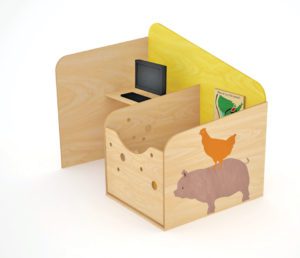
“This became a passion project, based on a roll of the dice,” Ratcliffe says. “It was something Sherri and I could do together.” | Photo by Mark Bialek
How do you make a living with a degree in the arts?
Blake Ratcliffe and Sherri Moore have built their lives—and their businesses—around that question.
These days, after exploring a myriad of arts-related fields, the couple head a children’s furniture business known as The Makers Creative, or TMC for short, with headquarters in Ann Arbor and a factory in Grand Rapids. They recently received an unexpected boost—with astounding results.
In January, a stranger named Ali Faruk posted a picture of a TMC combination work carrel and colorful wooden play center for young children that he had seen in a new library in Virginia. The post generated more than 586,000 likes, and the couple was besieged with requests for interviews and products. The innovative design was featured in the New York Times, the Sunday Times of London, and Good Morning America, among many other sources. Orders came pouring in.
But that’s getting ahead of a good story.
Both Ratcliffe and Moore entered U-M in 1977, Ratcliffe in the Residential College drama program and Moore in the art school. Moore graduated in the standard four years. Ratcliffe took another route: “Our daughter describes me as being part of the proud tradition of taking a ‘victory lap.’ I graduated from the Residential College in 1984. My ‘practical degree’ was in history, if that tells you anything,” he says, laughing.
The couple met at the Network, a former factory on what’s now the site of the Ann Arbor Y, which housed the Performance Network Theatre and other arts startups in the 1980s.
“We patched a quilt of freelance jobs together in order to earn a living,” Ratcliffe says. They both acted, and Moore took freelance jobs and painted in a rented studio. Ratcliffe headed Young People’s Theater and wrote plays and articles for the Michigan Daily, Detroit News Sunday Magazine, and the Ann Arbor News.
In time, they launched a design and marketing business out of their home on Marshall Ct., while Ratcliffe worked a day job at what would become ProQuest and earned an MBA from the University of Chicago’s weekend business school program. The couple became interested in designing children’s furniture after doing marketing work for companies in Grand Rapids, the center of innovative furniture design in the U.S.
“Our daughter was very young then, so she was our guinea pig,” Ratcliffe reminisces. The couple formed a partnership called Little Chairs and took their children’s furnishings to New York shows, where they generated interest and sales in prestigious stores. “The company did well, but the partnership didn’t,” Ratcliffe admits.
After the partnership dissolved, he says they considered moving their family to Silicon Valley, “but it looked like an all-consuming professional choice.” Instead, Ratcliffe quit work one summer, looking after their daughter while considering prospective business options.
Following countless hours of rumination and discussion, Ratcliffe and Moore launched what was then called The Midlands Company (for his father’s birthplace in England) in 1998. “Thanks to my work at ProQuest, we knew the library market, so we began creating a children’s furniture line for public facilities,” he explains. That year, they introduced their products with a display at an American Library Association meeting in D.C.
“This became a passion project, based on a roll of the dice,” he says. “It was something Sherri and I could do together. When we started, libraries were still paper storage facilities and their children’s sections were relegated to the second floor and back of the buildings.” But libraries had begun their transformation into community centers, with computer stations, meeting rooms, public programming, and children’s play and story areas—and TMC was ready to help in the transition.
Meanwhile, contacts with the Child Life organization inspired them to expand into the health care field by designing attractive learning centers for hospital lobbies and children’s wards. Their reputation grew, until they were the largest children’s contract furniture company in the country, with niches in the library world, health care, and corporate facilities.
After initially farming out manufacturing to shops in Grand Rapids, they opened their own “boutique factory” there. “We design and engineer and fabricate wood furniture ourselves,” Ratcliffe, “but we outsource metal and stone parts.”
TMC prioritizes the use of native Michigan hardwoods—“that’s important to us; it’s part of our value system”—and everything is sourced within thirty miles of Grand Rapids. Ratcliffe works in that city at least one day a week, but TMC’s headquarters remains here, in a historic brick storefront at 119 E. Ann St. “We like Ann Arbor too much to leave,” he says.
In the early 2000s, they ran into a trademark issue and reduced the company’s name to its initials. Two years ago, about the time the pandemic hit and impacted the business significantly, they “reinflated” its name to The Makers Creative.
Ratcliffe describes their prevailing style as mid-century modern, with a lot of bent-plywood construction. Sales fluctuate between $5 and $10 million a year, with a staff of twenty-five these days.
“We were larger in 2015 and 2016, employing more than fifty workers, but we were doing things we didn’t consider innovative-focused,” Ratcliffe says. So they doubled down on design, developing new products.
When Ann Arbor–based architects Quinn Evans got a job designing a new library in Virginia, they brought in TMC to create custom furniture in consultation with library staff. The result was the Fairfield Parent+Child Carrel that caught Ali Faruk’s eye.
And then came two company-rattling events: Covid and Faruk’s viral tweet.

The Fairfield Parent+Child Carrel went viral after a Facebook user saw it at its namesake Virginia library.
The Public Library Association meeting held in Nashville in March of 2020 generated a lot of attention for the Fairfield carrel, and TMC returned home with a feast of orders. Just ten days later, Michigan went into lockdown. Libraries closed, restrictive Covid protocols went into effect, trade shows were canceled, budgets were frozen, and the business squealed to a halt.
“I’d characterize the two Covid years as, to quote Mr. Dickens, ‘The best of times and the worst of times,’ ” Ratcliffe says.
After a month, TMC received authorization to reopen as an essential business. But when they returned, he says, business was “very, very slow.” Fortunately, because it relies on Michigan-based products, TMC didn’t face any shipping issues or shortage of materials.
No employees were laid off, “but it was very hard on cash flow—although certainly not as hard as folks in the restaurant business experienced,” Ratcliffe says. “We burned through our development money to accomplish a to-do list that in some cases had been growing for ten years.”
They used the downtime to relaunch the website, overhaul the factory, and install a new software system. They designed new products, created short- and long-term goals, and built furniture that could be ready when demand returned.
So in January, when Faruk’s tweet and photo of the Fairfield took off, TMC’s systems were up and ready to go.
Besides the massive coverage in the U.S., the story spread to New Zealand, Great Britain, Germany, and Italy, and orders began pouring in. “That was our fifteen minutes of fame,” Ratcliffe says. “We’re now seeing interest in distribution to Europe for library and school furniture.”
For the first time in two years, TMC exhibited at library trade shows this spring. Interest and orders were so encouraging that the couple began considering entering the high-end residential market.
Thanks to two years of planning and positioning, Ratcliffe believes the company is “ready for big-volume business.” They’re developing an e-commerce platform, to sell “more standardized, popular designs that we’ll manufacture to a stocking-program for quick shipping … The price point should be in the range of high-quality U.S.–made products, like the Eames furniture found on the Design Within Reach website.
“This is an exciting time in our company’s history—and in our lives,” he says.
He pauses, then adds, laughing, “Yes, two liberal arts majors can make a living while following their passions!”